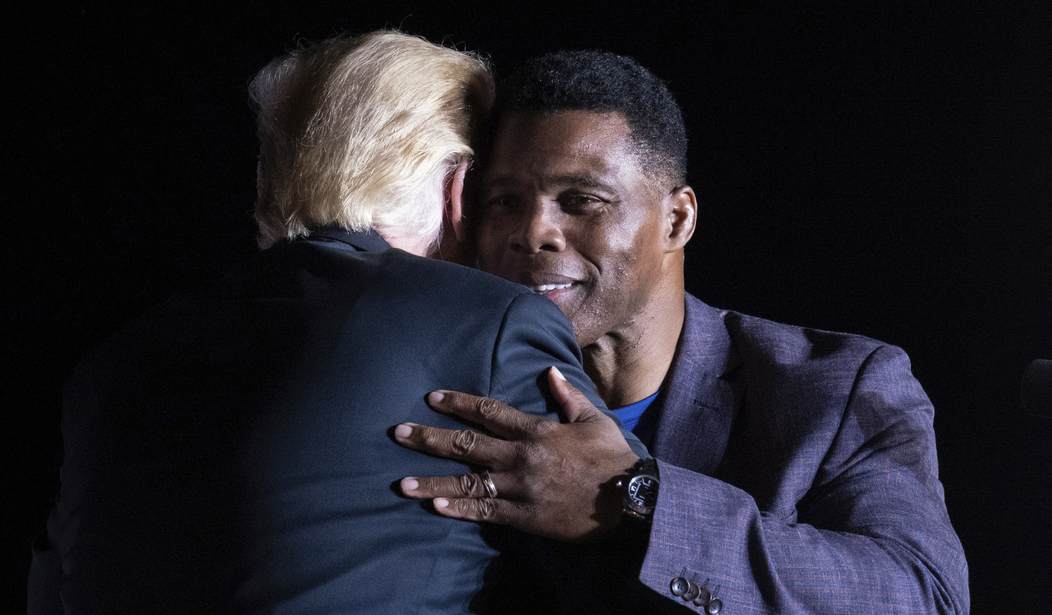A good tactical move? Sure … but for whom?
Donald Trump ended up with most of the blame for the GOP’s lackluster-at-best performance in the 2022 midterms. Republicans have one last shot at essentially holding serve in the Senate, with the Georgia runoff election taking place a week from today. Despite fears that Trump would try to bolster his own standing and 2024 campaign by holding rallies in the Peach State, everyone has agreed that Trump should phone it in instead. In fact, as Politico reports, that’s literally the plan:
A week before the Georgia Senate runoff, former President Donald Trump has no plans to appear on stage with his handpicked candidate, Herschel Walker. In fact, it’s not even under discussion.
The retired football star is traveling the state this week with a rotating cast of national GOP surrogates. But unlike Georgia’s January 2021 Senate runoff, when the former president held two rallies including an election-eve event, this time Trump has been conspicuously out of the picture. …
A person close to the Walker campaign, speaking on the condition of anonymity about Georgia’s “complicated dynamic” with Trump, said the campaign has not asked Trump to visit the state — and Trump hasn’t asked to come, either.
“We’re just trying to not rock the boat with any and all sides,” said the person close to Walker’s campaign. “We’re holding together a fragile coalition.”
Trump won’t be entirely out of the campaign, but his contribution will be both more targeted and with zero optics:
But people close to Trump say he has found other ways to be helpful to Walker, by continuing online fundraising and possibly holding a tele-rally in the coming week. And Trump also reiterated support for the candidate during his own presidential announcement at Mar-a-Lago.
This makes sense for Walker and the GOP, and in regard to the latter, not just for the runoff. Trump has defined himself of late almost entirely in the context of his 2020 election claims. So did the candidates he recruited, endorsed, and pushed in the midterms. Voters generally don’t want to use elections to litigate such complaints, certainly not for a former president who was never very popular with the broader electorate in the first place.
Walker wisely avoided that issue after the primaries, but the same can be said for some of the other Trump recruits — and they didn’t win anyway. Walker came in second in Georgia as well, and was only rescued by the state’s requirement for 50%-plus-one-vote majority for its statewide elections. He underperformed newly re-elected governor Brian Kemp by over 200,000 votes in the midterm, while Raphael Warnock overperformed Stacey Abrams by 130,000-plus votes. The sharp difference in performance is either a reflection of candidate quality, the Trump effect, or both. (The latter won’t get any better after the Mar-a-Lago meeting with Holocaust denier Nick Fuentes, either, which may have something to do with the Walker campaign’s late efforts to keep their distance.)
If so, however, what explains Trump’s willingness to cooperate? It seems out of character for a figure who practically defines himself as the sine qua non of everything in which he participates. His decision to launch his presidential campaign in the middle of the runoff practically begs for Trump to demonstrate his relevance and power by engaging in the last campaign of the midterms — especially given the blame Trump has gotten for the killing the GOP’s red-wave opportunities this cycle. Midterm endorsements and surrogate support is how presidential primary contenders measure their impact and convince others to join.
One has to wonder, though, whether Trump perceives the Georgia runoff as a trap. If Walker manages to eke out a win, Trump would have to split credit with Kemp, Ron DeSantis, and the other Republican surrogates who have already gone to bat for Walker in the runoff. If Trump holds a rally and Walker loses, Trump will get most of the blame again.
If however Trump stays out of it and Walker loses, Trump could argue that he wasn’t responsible for the disappointing midterm results at all. That would still be a tough sell, considering that Trump recruited and then pushed Walker for the nomination during the primaries. It’s still the safest bet for Trump, with the only potential downside being a Walker win without his overt help.
Turnout will matter most, of course. Converting Libertarian votes will matter too, but runoffs are about ground games more than anything else. For the moment, Trump’s absence might cool Democrat turnout enthusiasm a bit more than it will MAGA voters’ turnout. Regardless of all the 8D chess moves, Trump’s distance still gives Walker his best shot at a win next Tuesday. We’ll see if it’s enough.








Join the conversation as a VIP Member